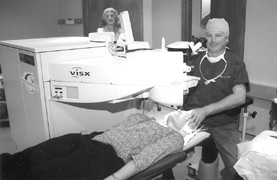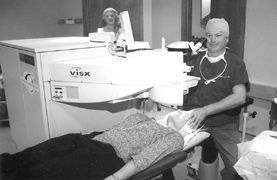
If any single factor has ruined the prospects of budding professional pilots, its poor eyesight. Yet that infirmity is correctable through refractive surgery, a procedure thats widely available and, increasingly, being considered by pilots of all ilks. We recently spent a day with reader Dr. Steven Siepser, an eye surgeon and AME in the Philadelphia area to clarify what can be confusing facts about LASIK an other procedures. In addition to being an AME, Siepser is also an instrument-rated fixed-wing and helicopter pilot.
Cutting right to the chase, lets talk about the FAA view on refractive surgery. There’s a notion that the agencys approval of these procedures is conditional or experimental. But isn’t the policy rather open?
First, as an AME, I don’t represent the FAA in private practice; I represent the client or the patient who comes to see me to the FAA. I also happen to be an eye surgeon.
So far as the FAA is concerned, there’s no specific guidance, no prescription against what you can have and what you cant have in FDA-approved refractive surgery. Regardless of the class of medical or the type of procedure, if you can meet the FAA eyesight standards, youre eligible for a medical. You do need to report the surgery at your next medical exam and submit to the FAA an ophthalmologic evaluation. The FAAs guidance suggests a period of one to six months to allow vision to stabilize after the surgery. The ophthalmologic report determines that, not the FAA.
But its very important that professional pilots consider hiring practices of the employers theyre interested in. An employer may have no problem with LASIK and increasingly, airlines seem to accept pilots who have had it. But this is complex and difficult to analyze because of what I call the scarcity factor.
If jobs are scarce or an employer is trying to eliminate applicants on any basis they can, if they can get a candidate with perfect vision, they may take him over somebody with glasses or whos had refractive surgery. The same applies to the military and service academies, which tend to reject PRK patients and may reject LASIK patients. I always tell patients to learn about these policies-the current policies- before having surgery.
A major concern for pilots is the side effects of LASIK or any refractive surgery. Glare and flare, specifically. How significant is this risk?
First, lets define glare, flare and halos. A glare disability is when you look at lights and its as though youre looking through something. You can still see but its compromised. If we took your glasses and smeared stuff on them, it would produce the same sort of halo glare.
If it has radiating lines, we define that as a starburst. Flare is where the light has a sort of torch; there’s a bright spot and then there’s more brightness that appears on one side or another. Halos are circles around things in the visual field.
So, if Im a pilot, this cant be good. How is it going to impair my flying? Or will it impair my flying?
During the day you would rarely have a problem because the pupils small. Night glare and flares-the incidence is fairly low-then you might have some problems.
I think in taxiing at night, the blue lights might have a hot starburst look or a glob of glare. You might have some trouble seeing inside the cockpit at certain light levels. For some pilots who wear glasses or contacts, there will be no noticeable difference.
Or approaching an airport at night where there’s just a ton of lights and theyre all glaring, and even for me with very good vision, I still cant find airports at night. So I just dial up my GPS and fly and I always tell the tower to turn the lights to high step or, at an uncontrolled field, Ill key them up high.
In terms of acuity, do these side effects reduce the ability to see functionally?
Not really, at least once the eyes have stabilized after surgery and assuming an enhancement has been done to achieve best results. It may affect something called contrast sensitivity, the ability to differentiate subtle differences in color. PRK, which causes very fine scarring, may reduce contrast sensitivity. The mere fact of putting contact lenses in front of your eye may do the same. One thing weve noticed that people complain about following laser surgery is variable vision during the course of the day. They tend to be highly observant people and they notice such things. In some cases, maybe most, they had the same variation before the surgery. It may not have been as noticeable.
My feeling now, as were treating larger and larger pupils, is that people who report glare are just happening to notice it because theyve had the procedure but actually had it beforehand.
We havent seen a lot of worsening of glare among well-informed patients. Initially, we had seen a few patients who had complained that they had glare. That was when we did slightly smaller treatment areas and we didnt glare-aware our patients.
Suppose you are troubled by post-op glare. Can it be corrected?
One of the things we recommend is for pilots or drivers having trouble with glare to have a bright red light in the cockpit. This causes the pupil to come down but it doesnt affect your night vision.
So the issue at hand is this: Is glare disabling? Thats a very individual thing because some people have a great deal of glare and go through life not really noticing. Then I come in and show them and they say yeah, that glare area is out to here. And when asked, theyll admit they always had it but it wasnt bothersome.
And then other people with the same glare say they cant drive comfortably at night. So it has to do with emotional state and how adaptive you are. In my practice, the incidence of serious flare and glare simply hasnt been significant.
Are there any age issues here for pilots considering LASIK?
The first thing to consider is that the youngest age we can do LASIK is 18 years old and to treat astigmatism, the age is 21. Those are the terms of the FDA approval.
An older patient may heal more slowly than a younger one and take longer to stabilize. But there are a lot of variables. Its not always possible to make generalizations. Much of it has to do with how healthy the person is.
Second, all of us who get past the age of 40 face presbyopia, the inability of the eye to accommodate and focus on close objects. If a nearsighted person were to take off his glasses, he could see up close because in reality, the image is projected right there. And that doesnt change with age.
Now if youre nearsighted and we make you perfectly sighted for distance and youre 50 years old, you no longer have the ability to focus on something close in because the image is behind your retina. Youll need reading glasses.
So for a pilot, the issue is if youre going to have perfect distance vision over the age of 50, you only need reading glasses to see the instruments or read charts.
So you have half glasses. There are some things coming down the pike, however, that will reverse this.
You mean surgical correction for presbyopia?
Exactly. The thinking used to be that presbyopia was the result of the lens becoming stiff with age but it now appears that the lens, like your ears and your nose, continues to grow with age. This makes it impossible for the muscles which pull on the lens to focus it.
The procedure is called SRP for surgical reversal of presbyopia and it involves surgically implanting four plastic bridges in each eye, which allow the muscles to stretch and focus the lens for near vision.
Were doing this surgery offshore now because its not yet approved by the FDA. Thus far, it looks promising.
Is it reversible?
The bridges are removable. There’s not enough experience yet to say if its reversible. Its too new.
In your informed consent documents, you plainly state that one risk of LASIK is losing a line or two of best corrected vision. Obviously, this is a concern. How often does it happen?
This varies by clinic and patient, of course. In our experience, we have seen less than one patient in a hundred lose one line of vision and weve never had one lose two lines. On the other hand, weve had many patients gain a line or two of improved vision.
In reading over some of the clinicals, we note that the broader outcome studies show a complication rate ranging between 1.2 percent and 2.2 percent, across a range of issues. This seems high.
There’s no denying that some complications do occur. If, for some reason during this procedure the eye moves or the operators asleep, whatevers going on, and the treatment isn’t we’ll delivered, that could make vision worse.
So those patients might drop in visual acuity, with glasses or without. They can never see as we’ll as they did before. I consider that a serious complication but its very rare. Our situation here-in our clinic-is that any patient who doesnt see 20/20 is back in our lap for an enhancement.
One recent study done in 1999, the Lin and Maloney study, revealed that complication rates for surgeons new to LASIK was as high as 6 percent during the first 100 operations. Obvious question, but does that mean a more experienced surgeon will have fewer complications?
Thats exactly what it means. There’s little question that a surgeon with 5000 operations will be more skilled than one with 200.
And that raises the hard question: What are the standards for selecting a LASIK surgeon. Are the mid-priced chains to be avoided at all costs? What about the clinic offering LASIK for $800 an eye, same-day service?
I charge $5600 for LASIK, which is at the high end. Having said that, I don’t think the buyer who can only afford $1500 should be priced out of the market; he should have access to refractive surgery at a price he can afford. But he cant expect to get the same service at that lower price. He cant, for example, expect as thorough an evaluation or post-operative follow-up and any required enhancement wont be free for a lifetime. I also think there’s some additional risk of complication at the lower price level and a potential LASIK patient ought to ask about that going in. If the clinic cant or wont provide that information, Id be wary of it.
Im working in a market where patients are highly sensitized to getting perfection and good service. Its like buying a new airplane with a little scrape on it. That little scrape is just horrible. You don’t care about having GPS and radar on this airplane that cost you a couple of hundred thousand dollars. All you can see is the $10 dent.
And that happens to some people after laser vision correction thats not what they expected. Theyre going to have buyers remorse because theyll be looking for the little thing thats not perfect and thus not see the benefit theyve gotten. Virtually everything I do in my practice is to deliver perfect results. The discount LASIK clinic may not do that.
So if youre advising a friend in selecting a LASIK doc, whats on the short list of things to look for?
Of course, Im biased, but I think the doctor-owned centers are a better bet than a chain or the corporate model because theyre more likely to have a better and newer laser.
Second, I think its desirable to have the doctor who owns the center and oversees the evaluation actually do the surgery. At a mass-market clinic, you may have a hired gun brought in from out of town and you don’t know if hes good or bad or if hell be there next week.
Thats not to say that the corporate clinic is bad or good but to me, its a question of greater security. Also, a doctor-owned clinic is more likely to have better, state-of-the-art equipment because by the time a corporate clinic pays for advertising and overhead to the company, there may not be much left for reinvestment. This is especially true of the equipment required to do the pre-LASIK evaluation.
Volume is an issue, too. Its just like maintaining flight currency. You cant do it with 30 hours a year.
In my view, a surgeon doing 20 LASIK procedures a month may not be maintaining the highest skill level, while one doing 100 a month probably is.
Last question: Youre myopic and wear contacts, why havent you had LASIK yet?
Good question. I have a different issue, in that even though I am presbyopic, I don’t need reading glasses yet. Since I do LASIK, I feel I should have it and intend to.
But once Ive had it and my distance vision is perfect without correction, I will need reading glasses. Other than that, I have no misgivings about LASIK.
Also With This Article
Click here to view “LASIK Isn’t the Only Choice.”
Click here to view “Getting a Handle on the Risks.”
Click here to view “Why I Decided to Have LASIK.”
Click here to view “…And Why I Didn’t.”
Dr. Siepser has performed more than 3000 LASIK procedures. He can be contacted at 610-296-8114 or www.siepservision.com.


